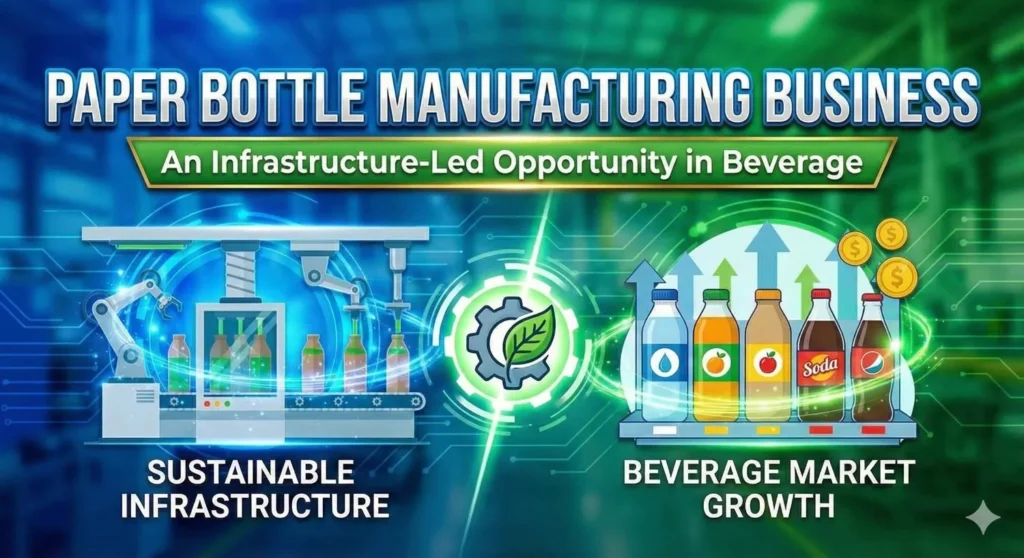Contents
Why Sustainability Matters in the Food and Beverage Industry in India:
The food and beverage industry ranks among the world’s biggest markets in India but struggles with multiple problems. The way we grow food today faces challenges from more people being born, earth’s shifting climate, and our resources running low. Sustainable food production lowers industry environmental damage and saves resources for future generations.Sustainability in food industry operations requires businesses to cut down waste and use natural resources while sourcing products near their facilities and showing full supply chain activity. As customer demand for eco friendly options grows the Indian food and beverage industry chooses more ethical and sustainable production methods.
The Rise of Conscious Consumers:
Today€™s consumers are more aware than ever that what they purchase has an impact on the environment. The revolution of conscious consumer across industries encourages change in the food production industries. The more people are choosing brands that care where they came from, make their things sustainably, and recycle too. In truth, research shows that 66% of consumers are willing to pay more for products from companies with sustainability commitments. This shift becomes an opportunity for the food and beverage businesses in India to cater to a growing segment of self-aware, Eco conscious consumer base.
Consumers now look for food products that are:
- Organic: It’s grown with no harmful pesticide or chemical usage.
- Locally Sourced: Backing local farmers and working towards a lower carbon footprint.
- Eco-friendly Packaging: With biodegradable, recyclable or reusable materials.
- Ethical Sourcing: And making sure we are practising fair lobar and responsible sourcing of the ingredients we make.
Sustainable Practices in Food Production:
1. Sustainable Farming Practices
Sustainable farming forms the basic elements of food production Eco friendly practices. These practices should target both soil sustainability and water conservation as well as preserve our natural environment for India’s food and beverage sector. Today’s farmers use crop rotation with integrated tree systems and several alternative organic farming strategies to improve soil health and lower environmental damage.
When growing food organically farmers must reject harmful chemical pesticides and fertilisers from their operations. At the same time the system develops habitats for beneficial plants insects and birds to live together.
Our Books
2. Minimising Food Waste
A major issue with food and beverage industry of India is food waste. In India, a large portion of the food produced actually ends up as a waste, either in farm, on the way to market, or from the retailers. Gardeners can add to the greenhouse gas emissions and strain on landfills by doing this with all their waste.
There have been a number of companies choosing to utilise technology to help them track their inventory and cut down on food waste. For instance, AI systems can estimate demand more accurately, and thereby reduce overproduction and related waste. Food rescue initiatives, in which unsold but edible food is donated to those in need, are also being turned to by companies.
We can also reduce food waste by getting consumers to purchase smaller quantities or fingers in the waste stream, and use leftover creatively. To tackle food waste, companies in India€™s food and beverage industry are getting to work with the communities, organisations and farmers in their regions to find the most sustainable solution.
3. Eco-Friendly Packaging
Achieving sustainability remains difficult because of packaging problems. Packaging made from plastic affects our environment and puts wildlife health at risk. The Indian food and beverage sector now uses recyclable and naturally decomposing packaging materials as its latest industry trends.
Manufacturers test eating-quality materials alongside decomposition packaging made from plant-derived components. Certain brands now use banana leaves as Eco-friendly replacement for plastic. Our method removes plastic waste yet keeps food from spoiling.
Glass and paper products plus aluminium provide sustainable packaging methods that recycle better than plastic items. Companies that choose sustainable packaging benefits Earth while serving the expanding customer demand for Eco-friendly products.
Our Project Reports
4. Ethical Sourcing practices and fair trade practices will be used.
More and more, food companies are under pressure from consumers to source ingredients ethically. So it means growing food in such a way that does not damage the environment or take people€™s ability to provide their work. In the food and beverage sector, the Indian firm are keen on the use of fair trade practice, which means that revenues to farmers and workers are fairly met and conditions in which they are working are safe.
Also Read
Another sustainable approach to reduce carbon emissions on account of long transportation is sourcing ingredients locally. Food companies can also help improve their communities by helping to support local farmers, thereby ensuring that they are using high quality, fresh ingredients in their products.
5. Analysis of Sustainable Supply Chain Management.
Any organisation in the food and beverage industry in India depends very much on an effective and sustainable supply chain. Working with material suppliers they trust and that work to prioritise sustainability, businesses can rest assured that their supply chain is both ethical and Eco friendly. That includes sourcing renewable materials, shortening transportation distance and minimising production’s impact on the environment.
Digital tools for monitoring a supply chain, tracking materials, and making sure they are meeting sustainability goals is also being picked up by many businesses. In fact, blockchain technology can help businesses move from farm to table trace ingredients and ensure they are sourcing responsibly.
Also Read
Building a Sustainable Future for the Food and Beverage Industry in India:
As more people live in India they will require more food. To maintain its growth in India the food and beverage sector needs to balance customer demand with practices that support environmental sustainability and protect the world. Global food production needs to change immediately to continue.
When business go green they protect the earth and position themselves to serve more customers who care about sustainability. Food and beverage companies in India can build a better future through sustainable farming methods plus Eco packaging while they reduce food waste and maintain ethical supply chains.
Your sustainable food business depends on partnering with material suppliers who offer quality and environmentally friendly products. Our business website presents resources, that supports your professional growth.
Conclusion:
The food and beverage industry in India leads the way toward sustainable practices. A sustainable consumer expects companies to match their priorities in farming and packaging while minimising waste so businesses should respond. Food industry players need to use technology plus ethical sources to deliver high-quality items and create a healthier environment for everyone. Food production must become sustainable to improve both the planet and our future life opportunities.
Contact Us
Frequently Asked Question
What does it mean for the food industry to go green in India?
Going green in the food industry means adopting sustainable practices across the supply chain. This includes reducing waste, sourcing ingredients responsibly, supporting organic and local farming, using recyclable or biodegradable packaging, and minimising carbon footprint from production to delivery.
Why are Indian consumers demanding more sustainable food products?
Consumers are increasingly aware that their food choices affect the environment and their health. Many now prefer brands that use organic ingredients, ethical sourcing, and eco-friendly packaging, and are even willing to pay a premium for sustainable options.
How are food companies in India reducing waste and inefficiency?
Companies are using technology and better inventory management to reduce over-production. Food rescue initiatives and partnerships with charities help divert edible food from waste streams. Some brands also encourage smaller portion options to cut down household and retail waste.
What sustainable packaging trends are emerging in India’s food sector?
Many brands are shifting from single-use plastics to biodegradable, compostable, or recyclable packaging. Materials like paper, glass, aluminium, and plant-derived alternatives are now common as companies aim to lower plastic pollution and meet eco-friendly consumer expectations.





